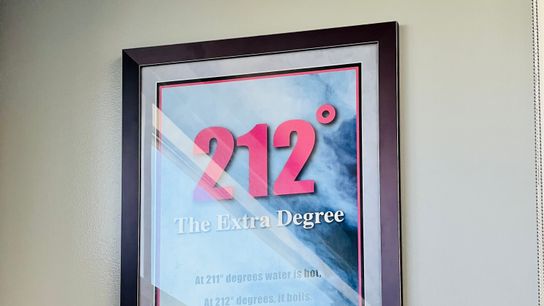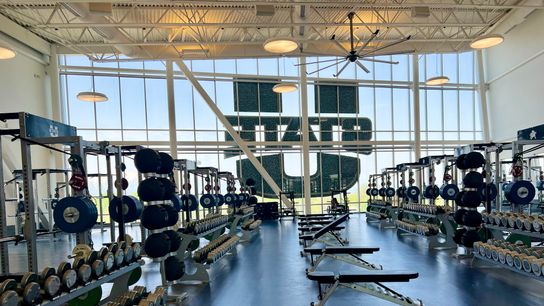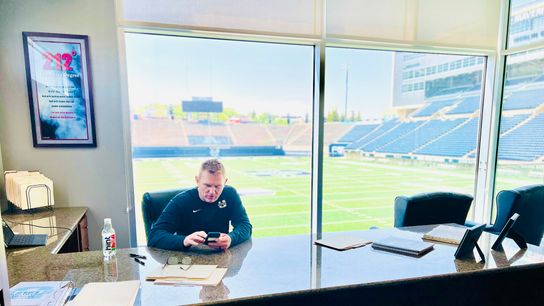LOGAN, Utah – It is after noon, well beyond the lunch hour, and Blake Anderson is making the rounds through Utah State’s Laub Athletics-Academics Complex eating breakfast from a disposable bowl.
A microwave-warm scrambler in one hand and spoon in the other, Anderson pops into the office of Scott Conley, the program’s veteran director of football operations who also owns a coaching pedigree that stretches to a stint at Southeastern Conference resident Tennessee under Johnny Majors, and then checks in with personnel and recruiting staff before ambling to his office for a Zoom on potential college football rules changes.
Though he doesn’t mind being in front of a computer, Anderson mutes the Zoom; an hour-long meeting of maybes and should-we discussions isn’t the screen-time that Anderson seeks as a lone Aggies player paces himself through an individual defensive walk-through beyond Anderson’s office windows on Merlin Olson Field.
No, entering his 32nd year in coaching Anderson finds himself in his most Zen state when performing among the very first tasks he recalls from his initial college job as a graduate assistant coach at Eastern New Mexico in 1992: cutting up film.
“The best way I work is just grab tape, watch it, rewind, even make my own cut-ups,” Anderson, entering Year 3 atop the Utah State program, tells FootballScoop. “I still do make my own cut-ups sometimes.
“That’s where I’ve always learned and progressed. I feel like I’ve been able to learn from a lot of people. I love it.”
What Anderson loves more is the mission field. His happens to be 120 yards, end zone to end zone, and 53.3 yards wide; hashmarks, logos and pylons serve as lines of demarcation.
Make no mistake, Anderson wants to win; works crazy hours as all in this incessant profession burn in an effort to win, but Anderson, above all, is a ‘Football Missionary.’
Coaching is his calling field, even if a simpler path might be walking away from public purview following the deaths of his wife, Wendy; father, Scotty, both to cancer, and son, Cason, by suicide, within the past four years.
“There’s been a ton of times I thought about is there where I need to be, is this where God wants me to be,” says Anderson, acknowledging the inevitable creep of doubt. “My oldest son, Coleton, after we lost his mom, after we lost Wendy, I remember him turning and looking at me and saying, ‘Dad, you gotta get back. I know you want to be with us, to help us, but you’ve got 150 people counting on you, too.’ Along this journey there’s been a lot of times, but I’ve always felt like God put me in coaching as a mission field. This is exactly where he wanted me to be, and I’ve done it badly a lot. But at times, you’ve been able to see Him through what we do. I thought it was really important that my testimony show that I trust and lean on Him even more in a time of crisis and tragedy than I do praising him when things are going good.
“I needed to be that same person when things weren’t going well. When I had lost a son. When I had lost a wife. When we weren’t having a great season. There were fans booing and that’s when I needed to be as visibly, I don’t know, just completely all-in in my faith and just show the best example I can be for those guys is that even when I’m hurting, when things aren’t going good, I come and I show up and I put one foot in front of the other. I think that’s the best witness that I can have and be really transparent with them, too. My faith comes from Christ, not from me. I’m not tough enough, I’m not big enough to do this on my own. If I left and I walked away, I would be robbing God of that opportunity, I guess, of the platform he put me on.”
Anderson sees that lone defensive player still working on the field behind him; knows there’s a poster about 212 degrees hanging over his right shoulder and an open bible on the front-left side of his desk. There’s no ignoring the message.
“Our motto is be one degree better every day. I tell them about how 211 degrees is hot, but 212 is boiling,” says Anderson, winner of three conference championships and bowl berths in his eight non-COVID seasons as head coach. “That one degree makes a big, big difference. We have one slogan: Be one degree better every day. And our core principles are to be selfless, tough and accountable. What can we control? We can control us, our attitude and effort every day.
“That’s kind of what I was talking about. How can I tell our players, ‘Don’t make excuses. Be tough,’ and then I’m going to walk away and quit because life gets tough? It spoke right back to me. And we’ve got to outwork people, because we’re not more talented than people.”
This season at Utah State represents Anderson’s 10th as head coach, and there are scars from last year’s campaign -- his first since his son’s suicide in February 2022 as well as the only time in his career that Anderson endures an entirely winless month (September).

This is a new Utah State team – Anderson embraces the challenge of never having the exact same pieces in back-to-back college football seasons -- with a new offensive coordinator: Anderson.
“I’m just a dude that loves ball. I’m not some huge innovator; I didn’t invent the game,” says Anderson, whose first season as an FBS coordinator came 21 years ago as MTSU’s co-offensive coordinator. “I do enjoy it. I feel like If you look at my career, I’ve been able to assess the situation and what we can do and what we have and figure out a way to make it kind of work. I felt like we were kind of in a place where everything went great Year 1, we had all the pieces and last year we just didn’t have all the pieces and we turned the ball over a bunch. I just felt like I could add some value by stepping in. Maybe some creative juices that were missing and maybe some organization where we were missing some things, or maybe just some different perspective because Tuck (Anthony Tucker) did a great job.”
Anderson is back as an offensive play-caller, the root of his rise through coaching and where 10 seasons of his assistant coaching experiences carry coordinator duties.
Remembering 20 years ago studying Hal Mumme and Mike Leach and ‘Air Raid’ components and Sonny Dykes, Anderson now chats with Lincoln Riley, Kendal Briles, Kliff Kingsbury and longtime friend Larry Fedora among others.
Anderson still packs his own materials.
“I just kind of took the Rich Rodriguez and Larry Fedora aspect of the spread and kind of blended what I thought the Air Raid was and we kind of found that sweet spot in the middle in 2003-04,” Anderson says. “That’s when we kind of became who we are and just gradually progressed throughout the years. A lot of good ball coaches have done the same. I’ve had a lot of great conversations with Lincoln Riley and Neal Brown and Kliff Kingsbury and Sonny Dykes, Phil Longo and Eric Morris. We’ve all just kind of continued to evolve. Eventually spent some time with Kendal, looked at what they were doing at Baylor; just me and him for a couple days and some cut-ups I’d made myself.”
None of it matters. Not without the bedrock of an Anderson program: culture.
Again, how else to explain an 11-win debut campaign, the ensuing grief-stricken offseason and then rallying to win five of last year’s final seven regular-season games to earn a berth in the First Responders Bowl?
“For me, to me, it’s about the guys in the building, players and coaches, knowing that you care about it, you love each other enough you’re going to fight for each other and sacrifice,” Anderson says in defining culture. “No egos in the building. We put others first. Christ came to serve; not to be served. That’s where it starts for me. I just feel like if we can build those kinds of relationships, and they know I care about them but I’m going to coach them hard and hold them accountable at the highest level, I’m not going to cut corners for them and not going to make excuses for them, but I do love them and I care about them. That’s why I’m going to discipline them and hold them accountable. But we’re also going to hold ourselves and each other accountable.
“Then I think you got a chance. Regardless of Xs and Os, if you’ve got culture, I think you’ve got a chance. The conditioning and developmental piece has to go with it, been lucky to have phenomenal strength staffs, and guys that really piggyback that culture piece.”
Culture manifests itself in different ways. Anderson’s first year stands for its championship; the second for its resilience.
“We won 11 games in ’21 and won seven of them in the fourth quarter,” says Anderson, praising Paul Jackson and the Aggies’ strength staff for undergirding that culture. “We were in great shape, and our guys believed they were in great shape and they would run and play hard. I think it all kind of fits together in that piece.
“Last year, it (culture) held us together. It held us together. We’d been through a lot in the offseason. They were right there when I lost my son, and they literally lifted me up every day. We had injuries on top of injuries, went through four quarterbacks due to injury and at one point had 27 guys out of the two-deep because of injury. Culture held us together. They wouldn’t quit on each other; they wouldn’t quit on me.
“When you’re coming off 11-3 and you go out and lose to a 1-AA team here at home (Weber State) and you come back to the locker room and it’s not just a bunch of pointing fingers and bickering and screaming and everybody being angry, when the immediate answer was, ‘I’ll do better coach.’ I was like, ‘OK, I don’t know how this thing is going to go, but we got a chance.’ It was immediate. Players said, ‘Coach, we want to have a team meeting. As leaders we’re going to stand up and tell everybody, we’ll do better. I’ll do better.’ They’re finishing sentences the way we do. They’re pointing to the same things. That was a moment. What we’re doing … matters.”
Likewise what Anderson is doing for Utah State resonates.
Austin Albrecht embodies Aggies football – growing up in-state, spending a five-year playing career for a pair of coaches and now entering his third season working for Anderson at his alma mater.
After spending the ’21 season as an offensive analyst at his alma mater, Albrecht is in a more public-facing role for the Aggies as the program’s director of player development and community engagement.

He’s working on summer internships for players, helping to scout potential Name, Image and Likeness fits – and giving facilities tours to showcase his alma mater. Anything to help Utah State.
What Albrecht sees from Anderson is unprecedented in his decade-plus with Utah State.
“He’s changed the culture and changed the future of this program,” Albrecht tells FootballScoop. “He’s changed where Utah State football can go.”
Anderson believes in growing the Aggies as he believes in continuing to grow himself – in faith and in football.
“As we develop and recruit and just continue to grow, I’d like to think we’re going to be in that picture and conversation every year,” Anderson says of an expanding College Football Playoff, set to debut with a dozen teams in 2024. “That’s saying a lot, but why not us?
“Why not us win the league and get into the playoff and make our run at it? Why not us? That’s our plan, is to play for championships and win a championship and get in the playoff.”
Anderson is resolved that neither tragedy nor triumph is charting his course.
“We can’t quit. I could quit tomorrow. Cason’s not coming back,” says Anderson, tears welling. “I’ve still got a lot of living to do, I’ve got kids to raise. I’ve got four to raise right now. I’m remarried (Brittany), I adopted two, I’ve got two older ones. If I quit and walk away, what am I teaching them? What am I teaching these guys whose parents sent them from all over the country to play for me?
“You get up and you go. Lean on the people on your path, that God put on your path, and you lean on Him and you go to work. Maybe with a limp, but you go.”
